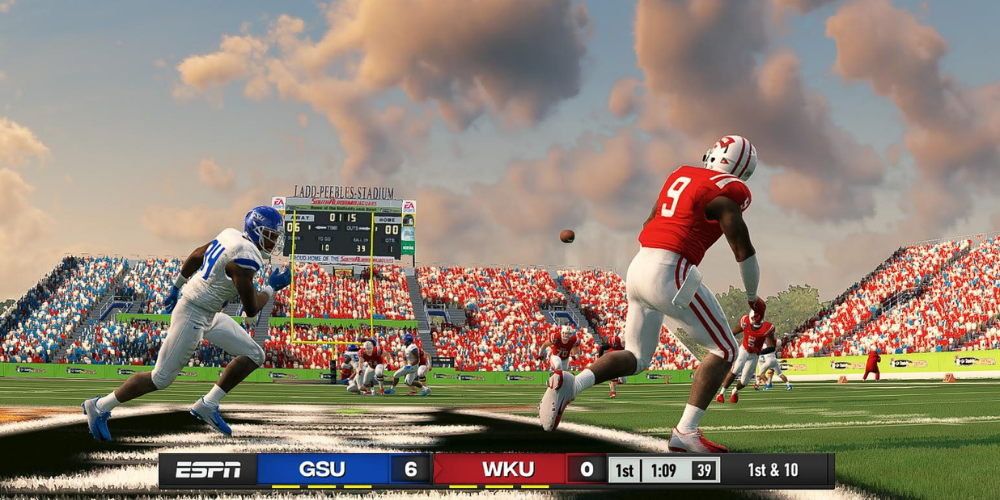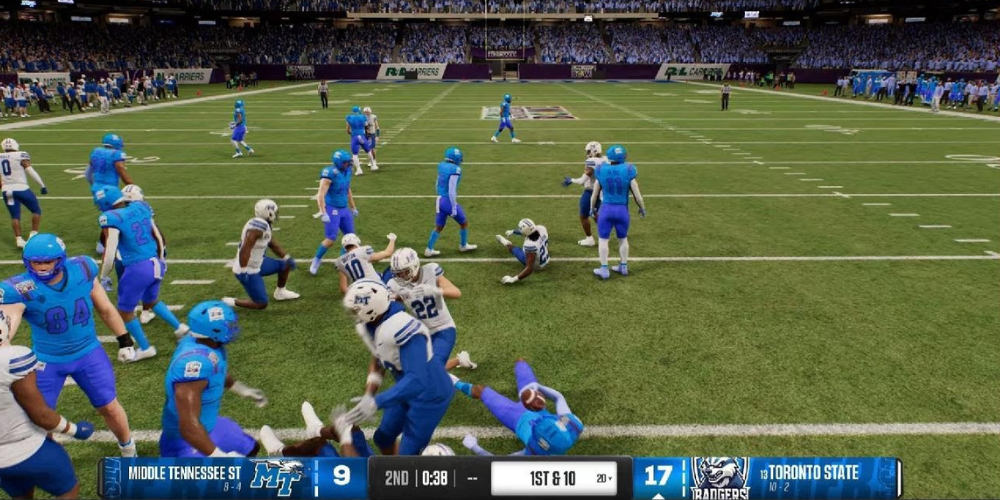EA Sports College Football 25: A Triumphant Return with Room for Improvement
- 2024-08-05
- 0
The moment all of your uncles have been anticipating for over a decade has arrived: EA Sports College Football 25 is finally here. With it comes a wave of nostalgia for anyone who played NCAA Football 14 or any of its previous installments, and an air of curiosity for those who have only experienced Madden. After you've played a decent amount of games and that initial rush is over, does EA Sports College Football 25 live up to the hype? To my surprise, the answer was yes.
At first, I was simply expecting a one-to-one Madden reskin. Yet, as soon as the first game started, the presentation and pageantry on display were quick indications that this was a brand-new ball game. EA Sports College Football 25 perfectly encapsulates what attending a college football game is like. Vibrant and viciously loud crowds, hundreds of university-specific walkouts and traditions, and uniquely designed stadiums make each school's ambiance give off its own air of distinct excitement.
That production isn't just for pre-rendered cutscenes, as EA Sports College Football 25 also looks impressive during its moment-to-moment gameplay. You can just about see every pore and bead of sweat running down players' skin as they bounce off each other, and movement and AI reactivity are much more realistic than what we've seen in Madden thus far.
The Run Game Experience

One of the first examples of EA Sports College Football 25's improved movement can be seen in the running game. Halfbacks touch guards' backs and run through holes instead of fumbling into them, and spin moves have weight and fluidity. On the other side of the ball, tackling has more dimensions than just contact or avoidance. A heavy defensive end's hit is far more impactful than that of a speedy cornerback, mirroring real-life dynamics.
The Passing Game Dynamics

The passing game also features sharp improvements, as the more intelligent AI--combined with the freeform placement pacing introduced in Madden 24--makes for some tight-window receptions. Corners can no longer be user-controlled right before the play and leap unrealistically for easy interceptions. Every pick in EA Sports College Football 25 is earned due to good coverage, playcalling, and skill.
My Ultimate Team Mode
While I don’t play it myself, it is also worth mentioning that My Ultimate Team (MUT) EA Sports College Football 25 has been added in. It is identical to what is in Madden, still placing plenty of focus and emphasis on microtransactions and pay-to-win gameplay. Anyone that enjoys it, regardless of this, isn’t going to be deterred from trying it out with college players instead of NFL stars.
Single-Player Career Mode: Road to Glory

Yet while EA Sports College Football 25 improves upon many of the foundations built via Madden, it also bears some of its burdens--especially the single-player career mode, Road to Glory. Everything about the mode is underwhelming, and it is easy to tell this is the case straight from the moment you begin. Instead of proving yourself as a high-school prospect as you did in NCAA Football 14, you simply choose your position and star rating at the outset. The higher the caliber of your player, the more chance you have at starting earlier. If you pick a lower-star recruit, you have to earn your spot.
While working your way up from the bottom sounds like it has the potential for a cool storyline, the process merely consists of playing the same minigames repeatedly in hopes that you eventually get playing time. Additionally, there isn't any story or commentary mentioning your rise to the top if you do so, meaning there is no point in picking anything less than a five-star player.
Restrictions on Player Agency
Once you get into the starting lineup, it is frustrating how little control your character has, even if he's the star quarterback. Sure, it is understandable that the coach wouldn't hand over the entire playbook to his freshman QB, but not being able to audible out of a play and having a limited amount of Play Change points per game to make it so that there are three play options instead of just one is far too restrictive. As an optional means of increasing immersion, this would be fine, but the inability to turn off these restrictions is a considerable letdown.
Academic Simulation Falls Short
Speaking of immersion, EA Sports College Football 25's attempt to replicate the academic life of a student-athlete is also a miss. When not playing in a game, your character is allocated limited energy points toward certain activities. Depending on your choice, you'll get XP increases or modifiers that can be used in the game. It doesn't take long to figure out how to game the system, as you just need to max out Academics for the first half of the season and completely ignore the Brand section, which has no impact on the game. Once you do, the rest of the season can be spent building XP and leadership to unlock upgrade points and in-game buffs.
Scenarios sometimes occur via the form of a text message, but their boosts are rarely significant, and their attempts at stories are half-hearted at best. The only one that did elicit a chuckle involved a situation where you can be blocked by a female student for over-texting her about going to a party. Outside of that, the off-the-field experience is unremarkable. Worse than that, if you skip managing the activity, your player will be impacted negatively on the field via injuries or debuffs to stats. Fortunately, Dynasty mode more than compensates for these shortcomings.
Dynasty Mode: A Versatile Experience

Where Road to Glory feels like a barebones attempt at career mode, Dynasty is a tapestry of planning and executing. Recruiting is considerably in-depth, as it takes into account specific player wants and needs and requires you to shape your team around them and invest time to land players. The amount of time and scholarships you have at your disposal are limited, so spending them scouting players you might not have a chance to sign is a roll of the dice.
The Intricacies of Recruiting
To improve your chances, you can overcome dealbreakers, including school prestige and playstyle. It's a surprisingly intricate system, requiring you to balance multiple players' needs during the recruiting process while also doing your best to win games during the season. The choice between picking an established coach or creating your own is also quite flexible, especially when considering how restrictive Road to Glory is.
Customization and Upgrades
Choosing an established coach comes with benefits such as abilities and upgrades, like improved recruiting, that give you a head start. Conversely, proving yourself and starting from the ground up allows you to customize your attributes and playstyle to fit how you like to play the game. This means you can allocate the upgrade points you receive from leveling up to any category in the skill tree instead of using whatever locked-in skill a pre-established coach has.
Realistic Outcomes

For those who enjoy a challenge, Dynasty mode also features realistic consequences for your actions. Fail to meet the expectations set by the contract, determined by school legacy, and you might find yourself looking for a new job after three years. This realism makes for some engaging scenarios.
Imagine getting released by LSU and then leading an underdog school like Kennesaw State to the college playoffs, ultimately beating your former school to win the national title. It's this type of vicarious scenario present in EA Sports College Football 25 that can make many of the other frustrating aspects worth enduring. Hopefully, EA can continue to build upon this solid foundation while also fleshing out the aspects of the series to help separate it further from Madden, creating a truly unique experience.






Leave a comment
Your comment is awaiting moderation. We save your draft here
0 Comments